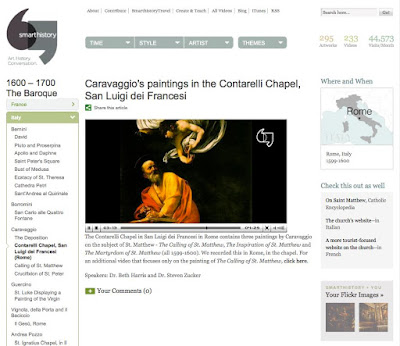Using the power and resources of the internet to explore art and history? We're in. I've got a fantastic resource to share with our Wandering Educators today. Smarthistory.org was created by Dr. Steven Zucker and Dr. Beth Harris, both art historians. It covers all ages of art history, from 400CE to today. It's about the history of art, learning about art, and creating a conversation about art. I delve in and emerge, hours later, enriched beyond belief. Smarthistory uses videos, podcasts, visuals, and even has a BRAND NEW iphone app on art in Rome. I LOVE IT!

We were lucky enough to sit down and chat with Steven, about Smarthistory, the new iphone app, how the internet is changing the way we learn about the world, and more. Here's what he had to say...
WE: Please tell us about Smarthistory.org...
SZ: Smarthistory.org is an open, creative-commons licensed, multimedia web-book designed as a dynamic enhancement or substitute for the traditional art history textbook. It delivers unscripted conversations between content-experts using multimedia. Smarthistory is designed with multiple pathways to allow visitors to browse according to their needs and interests.
Our motto is: Making art history safe for non-art historians.
In 2009, Smarthistory won the Webby award for education, it has been cited for the past two years in the Horizon Report and by organizations such as the International Council of Museums. Universities, libraries, and museums around the world direct their learners to us. Smarthistory is aimed at university students, travelers, museum audiences and was visited more than 450,000 times from more than 150 countries in 2009.

WE: What was the genesis of Smarthistory? Who contributes to Smarthistory? What is your background in Art and Art History?
SZ: Since 2005, Smarthistory has sought to make art engaging and accessible. Smarthistory is a labor of love. It was founded five years ago by two art historians, Dr. Beth Harris and Dr. Steven Zucker who each have twenty years of experience as college professors and museum educators. Many other art historians have contributed content and Smarthistory continues to grow and respond to the needs of traditional and informal learners—including travelers.
WE: How has the internet changed the way we learn about the world?
SZ: Smarthistory rejects the detached, sometimes aloof tone of the traditional textbook or guidebook. Instead, we use multimedia to engage visitors with unscripted conversations that reveal the complex and fascinating meanings within art and architecture. These are lively encounters full of disagreement, emotion, and the real experience of looking. These conversations model close looking and a willingness to encounter and engage the unfamiliar—both important skills for looking at art. We have found that multimedia allows museum visitors to simultaneously focus on the art and commentary, in a way not possible with text.
WE: Can you please tell us about your new apps for SmarthistoryTravel?
SZ: SmarthistoryTravel is a new initiative designed specifically for travelers. We are creating a series of apps that focus on cities that have important art collections. These apps are for curious, thoughtful travelers who want expert art analysis delivered in a casual and engaging conversational style. “Rome: A First Look.” has just arrived in the iTunes app store. Our first reviewer wrote,
"This mobile sets a new high standard for tour guide apps for consumers seeking to understand what is worth seeing and why."

A second app, “Rome: A Closer Look” will be available in a few weeks. Additional apps that focus on art in other cities will follow. Our apps are designed to be easy-to-use so that you’ll find what you need, when you need it. They contain video, audio, high quality photography and engaging writing. Each cover major works of art by key artists within the context of the city’s history. These apps are rich with additional information such as maps and local tips for visiting churches and museums, and for dining, shopping and getting around.
Proceeds from SmarthistoryTravel support Smarthistory, Inc., a not-for-profit educational organization dedicated to the advancement of art history research and education through the open sharing of resources and knowledge.
WE: What's up next for Smarthistory?
SZ: Lots! We hope to finish our second Rome app in the next two weeks and then start one for Washington D.C. We were recently invited to speak at a conference in Barcelona and hope to take the opportunity to create apps there and in Madrid. And we always listen to what our visitors tell us they need.
WE: Thanks so very much, Steven! We love and highly recommend Smarthistory to our Wandering Educators.
For more information, please see:
http://smarthistory.khanacademy.org/
All photos courtesy and copyright Smarthistory.org
